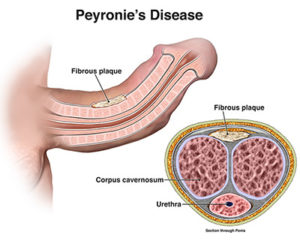 Many men develop Peyronie’s Disease, though many men do not realize that so many others have it. This condition occurs when a fibrous scar tissue develops along the inside tissues of the penis. This causes the penis to become more curved when you have an erection. It can also cause pain in this area. When you have a curved erection that is more than normal – some men have a naturally curved penis from birth – that may be an indication that it is time to see a urologist about Peyronie’s Disease.
Many men develop Peyronie’s Disease, though many men do not realize that so many others have it. This condition occurs when a fibrous scar tissue develops along the inside tissues of the penis. This causes the penis to become more curved when you have an erection. It can also cause pain in this area. When you have a curved erection that is more than normal – some men have a naturally curved penis from birth – that may be an indication that it is time to see a urologist about Peyronie’s Disease.
What Should You Know About Peyronie’s Disease?
In a small number of men, Peyronie’s Disease can go away on its own. This is not often the case, though. In some cases, it remains stable and doesn’t change after an initial period of changes. In other men, it can worsen over time. It does not necessarily mean there is anything wrong with a man’s health. However, it can cause some men to struggle to have sex. Some men may be unable to have a strong erection as a result of Peyronie’s Disease as well. And, for many others, it can cause anxiety and stress.
What Can Be Done About Peyronie’s Disease?
The first step is to come in to see your doctor. When you do, we’ll determine how severe the condition is. In some cases, no treatment is necessary, but in others surgical procedures may be helpful to you. This will depend on the amount of curve in your penis, whether or not you can and still want to have sex, any pain you have, and if you have good erectile function overall.
If treatment is warranted, it generally will start with the use of medications. These can help to reduce the amount of plaque present and, over time, reduce the amount of curve present. If this treatment does not work, surgical options are available. This may include suturing in the unaffected side, incisions and grafting procedures, and the use of penile implants. The good news is that there are treatment options that may help you.
Your first step is to see a specialized urologist in New York that can help you with Peyronie’s Disease. When you come in for an examination with our team, we’ll help you determine what your treatment options are and help you to get the support you need. Schedule an appointment with us today.
Call our offices today at 212-675-3186 to discuss the concern and to learn what solutions may be available to you.
